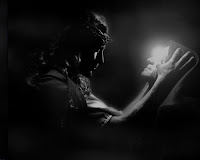Summary of Last Meeting's talk:(Given ByFred Kreuder on 6/21/10)
Our Men's group provides a forum for Christian fellowship, prayer, support, and religious knowledge. It is a place to grow in our spiritual maturity as we grow in our relationship with God.
Catholics believe that God reveals Himself to us in Jesus Christ through both Divine Tradition as well as Sacred Scripture.
The Word of God in written or oral form is interpreted authentically by the magisterium (teaching body) of the church.
In order to grow in our relationship with God, we need to know Him better. One way to accomplish that is by reading His Word.
Catholic bibles (for example: New Jerusalem, New American) are different from non-catholic bibles.
The Old Testament (OT) of the of the Catholic bible contains 7 additional books, called the deuterocanon (Maccabees 1 & 2, Sirach, Tobit, Wisdom, Judith & Baruch, as well as extended versions of Daniel and Esther), that are not in most non-Catholic bibles. These seven books were part of the Septuagint, the version of the OT that was used by Jesus and the Apostles, particularly when preaching to the Jews of the Diaspora (2/3 of all Jews in Jesus' time).
A proof that Jesus and the Apostles used this version of the OT can be found in John 10:22-36 where they celebrate the feast of Hanukkah (Dedication and re-consecration of the temple alter). The only OT books that mention this feast are Maccabees 1 & 2.
In 397 AD, more than 360 years after Christ's death and resurrection, the canon of the Old & New Testaments are proclaimed at the Council of Carthage III. Up until this time, many other books (i.e. Gospel of Thomas, Letter of Clement, the Didache, etc) were used in liturgies in Christian communities. This canon is the same one that is currently used by the Catholic Church.
During the Reformation in the early 1500's, in order to comply with non-Catholic doctrine, Protestants removed the seven books of the (deuterocanon) OT named above and tried to remove Revelations and the epistles of James and Jude. Martin Luther also added the word "alone" to Romans 3:28.
Knowing how the canon of the bible developed is very important to Catholics. The Church did not spring from the bible. The Church existed first and then compiled the Word.
The Protestant doctrine of "the Bible Alone," "Sola Scriptura," is not found anywhere in the bible!
Protestants also have "traditions" such as alter calls and worshiping on Sunday that are not proscribed by the bible. Worshipping on Sunday is part of our rich Catholic tradition. the bible says to "keep holy the Sabboth (Saturday).
1 Peter 3:15 calls us to be able to provide a defense of our beliefs and to do so in a gentle and reverent manner. Understanding Catholicism is our first line of defense. Most non-Catholics are at odds with what they perceive the Church to be and not what it actually is.
We are called by our faith into an ecumenical communion with our non-Catholic Christian brothers (see the Catholic Cathecism pps 813-822).
It is our mission as "Fishers of Men" to spread our understanding of our Catholic faith. It is our duty as Catholic men to learn as much as we can regarding our faith so as to provide a ready defense of it. It is our duty as Catholic men to reach out to our Protestant brothers with compassion and love in order to initiate the dialogue that leads toward Christian unity. BE NOT AFRAID to take the first step. Trust in God to guide you.
Recommended Reading:
Catholicism and Fundamentalism, Karl Keating
Catholic and Christian, Alan Schreck
Making Senses Out Of Scripture, Mark Shea
Where Is That In The Bible?, Patrick Madrid
Where We Got the Bible, Bishop Henry G. Graham
Catechism of the Catholic Church
Understanding the Scriptures- The Didache Series, Scott Hahn
Reasons to Believe, Scott Hahn
By What Authority, Mark Shea
Surprised By Truth, Patrick Madrid
Inside The Bible, Kenneth Baker, S.J.
The Faith of the Early Fathers, William Jurgens
Recommended Web Sites:
Catholic Answers: www.catholic.com
Catholic Men's Ministry: www.catholicmensministry.net/index.html
National Fellowship of Catholic Men: www.nfcmusa.org/
Recommended Video: Why Be A Catholic, Tim Staples
Recommended CD's Available at: www.lighthousecatholicmedia.org/
The Mass Explained, Fr. Larry Richards
The Truth, Fr. Larry Richards
The Lamb's Supper, Scott Hahn
Why a Protestant Pastor Became Catholic, Scott Hahn
Why Do We Have A Pope? Scott Hahn
A Call to Joy, Matt Kelly
The Bible Made Me Do It, Tim Staples





